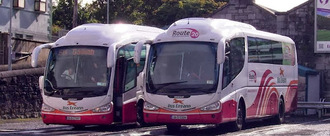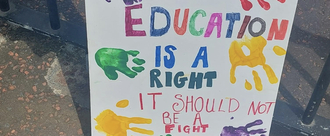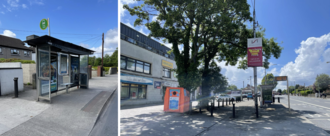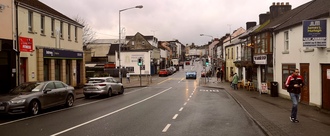- Featured
- Animal Rights
- Anti-racism
- Arts & Culture
- Children
- Climate
- Corporate accountability
- Crime
- Disability rights
- Economic
- Education
- Environment
- Food and Sustainable Production
- Gender Equality
- Governance and Transparency
- Health
- Housing
- LGBT Rights
- Mental health
- Northern Ireland
- Planning
- Privacy and Data Protection
- Rural Inequality
- Social Justice
- Trade
- Transport and Infrastructure
- Workers' Rights
- More
-
Fix Enduring Powers of AttorneyPrior to April 2023 an Enduring Power of Attorney (EPA) only needed to be registered in the event that the person who created it subsequently lost mental capacity. Approximately 1,200 EPAs were registered each year up to 2022. It is estimated that only 15% of EPAs created under that old system subsequently required to be registered, which would mean that approximately 8,000 EPAs would have had to have been created each year to produce the figure of 1,200 registered, or 670 a month. In April 2023 the Decision Support Service (DSS) was established and the system for creation of EPAs was radically changed. It was expected this new system would enable wider uptake of EPAs by the public and ensure greater protection of vulnerable people as they age. However, as of 28 February 2024, it was stated in answer to a parliamentary question that only 697 EPA applications had been submitted to the DSS for registration in its first ten months of operation, roughly what would have been created in one month under the old system. In other words 10 times less than before. The new system intended to increase the number of people with EPAs has resulted in a collapse in the numbers being created in contrast with the old system which worked very well. The problem is an online platform imposed on the creation of EPAs by the DSS which does not enable a professional adviser to access the platform on behalf of anyone wishing to have their assistance with the creation of the documentation to ensure that it is done correctly. Anyone wishing to have professional assistance in the creation of an EPA via a digital platform should be facilitated in doing so and is entitled to have their professional adviser access the system on their behalf to advise and assist in preparing what can be complicated and profoundly important documents with serious legal consequences. Revenue’s online ROS system allows a tax adviser to prepare and file returns for a taxpayer. The Injuries Resolution Board’s web-portal allows an agent to prepare an injury claim on behalf of a claimant. The Land Registry, the Companies Registration Office and others all do likewise. The DSS platform does not and that needs to be fixed urgently to allow people who want help from their professional advisers in creating an EPA to get it by providing professional advisers with access to the new online platform on behalf of anyone wishing to have their assistance. This is a change required to fix the system for creation of EPAs that can and should be made immediately to end this crisis in the creation of EPAs which is causing serious problems for vulnerable people who need to have them in place. We are signing this petition to ask the Minister for State to fix this problem as soon as possible.1,488 of 2,000 SignaturesCreated by Flor McCarthy

-
Reinstate Public Bus Service between Galway and DublinIn 2021, the Bus Éireann route 20/X20 was cancelled, impacting commuters in Galway City and towns such as Craughwell, Loughrea, Aughrim and Ballinasloe. The route was privatised and replaced with the 706/706X route ran by a private company. This route ignored Craughwell, Loughrea and Aughrim and left Ballinasloe with less frequent services. Now in 2024 the private route is being cancelled, with the company saying it is not profitable enough. Public transport is an essential public service and should be ran as such, not left to the whims of private companies.963 of 1,000 SignaturesCreated by Adrian Curran
-
SEN Reform in Northern Ireland: URGENT ACTION REQUIREDAll children can learn. All children have a right to an education and we need to stand up for some of the most vulnerable children in our community who are being denied an education.5 of 100 SignaturesCreated by Emma Morgan
-
Save Our Malahide Road Bus StopsBus Connects has been granted permission by An Bord Pleanala to remove the bus stops at Danieli Road (1219) and Killester Avenue (1220). These are proposed to be replaced by a single bus stop outside Artane Cottages Lower, on a narrow footpath with no room for a bus shelter. This means there will be no bus stop with shelter or seats on Malahide Road southbound between Artane Roundabout and Maypark (near Donneycarney church), a distance of almost 1km. The local community is losing two well-used bus stops with full amenities situated on wide footpaths. Instead, all bus passengers who would otherwise use those two stops will be forced to wait on a narrow footpath directly outside the doors and windows of the houses at Artane Cottages Lower, with no shelter or amenities. This will affect every passenger using the bus service along this whole stretch of the Malahide Road. The biggest impact will be on older passengers, passengers with disabilities and those travelling with children. The distances to bus services for residents from Killester Park / Craigford Drive and St. Brigid’s / Danieli Road will increase significantly. The severe impact on all bus passengers in the area and on the residents of Artane Cottages Lower has been explained many times to Bus Connects in public consultations and formal objections to their proposals, but no changes have been made or instructed to them by An Bord Pleanala. At this stage, the only option to prevent this proposal from being implemented in the Bus Connects scheme is to put pressure on the NTA and the Bus Connects project managers and engineers to revise the detail design for the stops between Artane Roundabout and Maypark in the next stage of the works. Help us to lobby Bus Connects to revise the design. Please sign the petition AND email them at [email protected] to tell them to save our bus stops.1,569 of 2,000 SignaturesCreated by Save Our Stops
-
We need a local bus for Mullingar townLet's make Mullingar accessible to everyone, bring the bus!345 of 400 SignaturesCreated by Raimonda Masiulyte - Ramchurn
-
TV stations must add live captioning & subtitles. Deaf & hard of hearing people need TV too.Both my parents are hard of hearing, they had three children with full hearing. We grew up with sign language, with subtitles on the telly and with an appreciation for how hard things are for deaf people. There's 103,000 deaf or hard of hearing people in Ireland. They deserve a decent subtitling service, regardless of the T.V station, show or type of programme. Unfortunately subtitling is patchy, sometimes out of sync or sometimes not provided at all. Please support this by adding your name.383 of 400 SignaturesCreated by Jason Collins
-
Swimming Pool for North FingalChildren in Balbriggan and surrounding areas do not have the abillity to swim. Only 6/23 schools surveyed in north county Dublin have swimming on the curriculum. Balbriggan was promised a swimming pool in partnership with the rugby club in a plan scrapped in 2016. Skerries was promised a swimming pool years previously. People have to spend time and money to access a pool outside the area. Swimming is a basic life skill and contributes to sport and health of our community.129 of 200 SignaturesCreated by Garrett Mullan
-
Stop Targeting Disabled People with Discriminatory Policies - Tear up the Green PaperDisabled people want to live full and equal lives. We want to work in secure, adequately paid employment with the necessary education, skills, qualifications, access, opportunities, and services i.e. Personal supports and transport. Forcing people into discriminatory and degrading assessments and being categorised based on impairments for the purpose of social protection is degrading, inhumane, and tramples over our human rights as per UN Convention on Rights of People with Disabilities and the Employment Equality Act.233 of 300 SignaturesCreated by Clare Leader Forum Rights Not Charity
-
Say YES to Linking Private Housing Rental with Property TaxJoin this campaign to emphasise a logical solution to the housing crisis.5 of 100 SignaturesCreated by Louise McMahon

-
Petition for Inclusive Education and Equal Access for Deafblind Children in IrelandWho is affected? Deafblind children, their families, and the broader community are concretely affected by the existing barriers to inclusive education. The current lack of specialized services and resources denies these children the opportunity to fully participate in educational settings. As a result, they are often isolated, unable to communicate effectively, and face significant challenges in acquiring the necessary skills to thrive academically, socially, and emotionally. What is at stake? The consequences of maintaining the status quo are far-reaching and deeply impactful. Without inclusive education and tailored support, deafblind children risk being left behind, depriving them of a quality education and limiting their future opportunities. By neglecting their needs, we deny them the chance to develop their talents, contribute to society, and lead independent and fulfilling lives. Additionally, the lack of equal access to education perpetuates social inequality and discrimination, further marginalizing an already vulnerable group. Why is now the time to act? Immediate action is imperative as every passing day without intervention exacerbates the challenges faced by deafblind children. The critical developmental stages during early childhood necessitate early intervention services that foster communication skills, sensory development, and social interaction. By addressing these needs promptly, we can enable deafblind children to reach their full potential, unlocking a brighter future for them and empowering them to become active, engaged members of society. We firmly believe that every child, regardless of their abilities, has the right to an inclusive education and equal access to educational resources and services. Therefore, we respectfully request that you consider the following measures: Develop comprehensive guidelines and policies that ensure inclusive education for deafblind children at all levels of the education system. Allocate sufficient resources to provide specialized training for teachers and educational professionals to effectively support deafblind children. Establish early intervention programs that focus on the unique needs of deafblind children, providing appropriate services and support from an early age. Collaborate with relevant stakeholders, including organizations specializing in deafblind education, to develop and implement best practices for inclusive education and support services. Raise awareness among the broader public about the rights and needs of deafblind children, fostering a more inclusive and accepting society. We urge you to take immediate action to address the pressing issue of inclusive education and equal access for deafblind children. By doing so, you will contribute to a more inclusive society where every child can thrive and fulfil their potential. We kindly request a meeting with you to discuss our concerns in more detail and explore collaborative solutions. We are confident that by working together, we can bring about meaningful change and ensure a brighter future for deafblind children.14 of 100 SignaturesCreated by Bronwyn Kircher
-
Clongriffin Dart AccessEncourage & facilitate use of public transport. Currently women, girls, people in wheelchairs, with bikes & buggies are either afraid or cannot access station.2,837 of 3,000 SignaturesCreated by Joan Hopkins
-
Equal Protection for All at IPO DublinAn equal society is a better society for everyone.19 of 100 SignaturesCreated by Aisling Hudson

.png)










